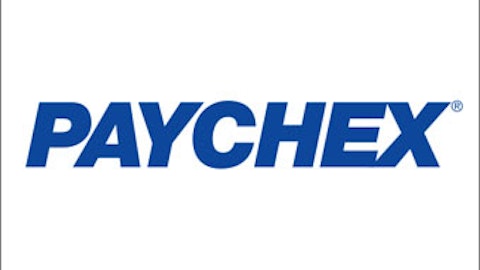Key Risks
Unlike many other businesses, PAYX is somewhat refreshing in today’s macro environment because it has no overseas exposure, is not sensitive to commodity prices, and has no currency risk. It is most sensitive to the U.S. labor market, which has been improving.
However, as a technology company, PAYX is at somewhat greater risk of disruption than many other businesses because the pace of change tends to be faster.
Investors seem to have two primary concerns with PAYX – the lack of growth available in the company’s core payroll services business and competition from new entrants such as Zenefits and Gusto (formerly known as ZenPayroll).
Regarding growth, the payroll services market is rather mature. However, it continues growing at a low-single digit pace. More importantly, PAYX has successfully expanded its portfolio to include numerous human resource services. These businesses account for a significant part of PAYX’s sales mix (39%) and have consistently grown at about a double-digit pace. Their market shows no signs of slowing down.
The company also offers various accounting and financial services (e.g. cloud-based accounting, payment processing, etc.) to businesses but notes in its annual report that “these services are in their infancy.”
The takeaway is that PAYX has expertise in introducing (or acquiring) new products needed by small and medium-sized businesses, and its existing distribution channels are very effective at quickly scaling up new services. We expect the company to continue finding growth opportunities adjacent to the payroll services market. With over 10 million addressable businesses in PAYX’s geographic markets, there should be plenty of opportunity for continued growth.
New entrants pose a greater concern to us as they have made a strong case for themselves with users. Technology (e.g. the cloud) is accelerating the rate of change in the industry, and start-up costs are increasingly insignificant. Newer software companies typically have products that offer better user experiences, lower costs, and greater innovation compared to large incumbents such as PAYX.
Zenefits is the most newsworthy rival and was founded in 2013. The company’s private market valuation reached more than $4 billion over the summer of 2015, despite expectations of generating up to $100 million in sales this year.
Zenefits runs a very different business model than PAYX. It provides free, cloud-based solutions that reduce human resource paperwork and provide a single place to manage payroll, health insurance, and other systems. Zenefits makes money by acting as an insurance broker and collecting a commission on the health insurance coverage that businesses purchase from health care providers. However, it also launched its own payroll processing service in November 2015, reducing its dependence on partners such as PAYX.
Like many startups, Zenefits has hit some bumps that could endanger its future. A Wall Street Journal article from November 2015 noted that the company is “falling short of its aggressive revenue targets,” has frozen hiring in certain departments, and has reduced pay for some executives. Regulators have also provided headwinds, arguing that the company is illegal because its free software constitutes a gift, which isn’t allowed in the health insurance business.
Like many tech startups, Zenefits is not likely profitable and, depending on how growth shakes out in the coming years, might not even survive. Fidelity Investments marked down the value of its investment in Zenefits by 48% during the third quarter of 2015 (it invested in May 2015).
On the payroll side, Gusto has emerged as a strong new entrant. Gusto is much cheaper than PAYX and provides a more pleasant user experience. It also recently added human resource services to significantly improve the scope of its offering.
PAYX can combat new entrants in several ways. First, it can use its $900+ million in cash to acquire them or invest in similar functionality to stay relevant for its customers. Since Gusto and Zenefits emerged several years ago, hundreds of imitators have cropped up that PAYX could pick off.
The company is also investing in its software to stay “good enough” for customers not to switch. Roughly 80% of PAYX’s clients now have an online connection to them – accessing reports, using mobile apps, processing their payroll. Its new Paychex Flex solution also received favorable reviews by PC Magazine. PAYX will continue investing in cloud-based technology and mobility applications to improve the user experience.
Perhaps most importantly, PAYX has strong brand recognition and trust in the market. Payroll and human resource services must be working correctly 100% of the time. Until Gusto and Zenefits establish a longer track record, many of PAYX’s customers are less likely to jump ship. However, they could push for reduced pricing in future contract negotiations.
Until we see signs that PAYX is starting to struggle with profitable growth, we believe the highly fragmented nature of the market, secular growth in human resource services outsourcing, and strong brand and sales channels maintained by PAYX will keep the company chugging along.
Dividend Analysis
We analyze 25+ years of dividend data and 10+ years of fundamental data to understand the safety and growth prospects of a dividend. PAYX’s long-term dividend and fundamental data charts can all be seen by clicking here.
Dividend Safety Score
Our Safety Score answers the question, “Is the current dividend payment safe?” We look at factors such as current and historical EPS and FCF payout ratios, debt levels, free cash flow generation, industry cyclicality, ROIC trends, and more. Scores of 50 are average, 75 or higher is very good, and 25 or lower is considered weak.
PAYX’s dividend payment appears to be very secure with a Safety Score of 81, even despite the company’s relatively high payout ratio.
Over the last four quarters, PAYX’s dividend has consumed 80% of its earnings and 72% of its free cash flow. These payout ratios are on the higher side of dividend stocks we prefer to invest in and leave the company with less margin of safety and typically lower dividend growth rates. The business needs to be very stable and have a clean balance sheet to justify high payout ratios (PAYX does).




